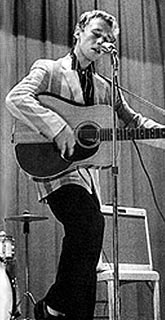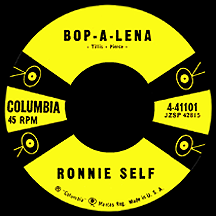RONNIE SELF
Bop-A-Lena
One day some 20-plus years ago I stopped in at one of those big name record stores to browse the CD bins, a frequent every-week-or-so routine. Walking in, I was assaulted with the song "Bop-A-Lena" blasting out of the shop's multiple speakers! Not exactly the type of music typically played in those big stores of the late '80s, but I'll never question why one of my faves is being cranked up in a public place. When the song was over, the young, spike-haired employee behind the counter played it again! He began extolling the brilliance of the song's unconstrained wildness, the shrieking vocal perfection, envisioning the needles of the VU meter on the studio console peaking all the way past the red, creating an "awesome" distortion. He played it again and again, turning it louder so the walls would vibrate, convinced he'd found the first "punk" single ever recorded. And he probably wasn't far from the truth.
By December 1957, the rock and roll era was well under way, and the rockabilly subculture made viable in large part by Sam Phillips' Sun Records was very close to its peak. Ronnie Self raised the ante with "Lena," possibly the most over-the-top two minutes committed to wax up to that time. Written by country diehards Webb Pierce and Mel Tillis, it was unlikely they had envisioned Self's interpretation. A contract with Columbia Records had already been opposed by the label's head of A&R, Mitch Miller (who was basically against all things rock), but Mitch didn't have the final say. The execs at conservative Columbia who okayed his signing must have had second thoughts when they heard the pseudo-earthquake in the studio during Ronnie's early recording sessions. Wish I'd been there to see them squirm!
Born in Tin Town, Missouri in 1938, the son of a railroad worker, Ronnie was quite a troublemaker by the time he was in high school, hanging with a group of outcasts...in other words, just the kind of atmosphere to draw upon for writing songs. He began recording and sending demo tapes around, getting interest from Red Foley's manager Dub Albritten which resulted in "Pretty Bad Blues," a top-notch shuffling rocker released as a single by ABC-Paramount, but it sold poorly. Categorized by Albritten as a country singer, as many early rock acts were, he was booked to perform on the Phillip Morris Caravan on dates with established acts including Carl Smith, Goldie Hill and Red Sovine. His unhinged moves on stage and high-decibel vocals (reminiscent of Elvis in the early going) upstaged the bigger acts and Columbia Records became interested in an attempt to catch up to the head start that most other labels already had in the rock field. The first singles, "Big Fool" and "Ain't I'm a Dog," were good mid-tempo country-rockers ...then came "Bop-A-Lena," which went midway up the national charts in March and April 1958.

Promising sales and airplay notwithstanding, his wild-boy reputation made promoting the record an uphill battle; television variety shows, for example, avoided him. Columbia, generally cautious with its artist signings well into the next decade, dropped him after just a year. A hearty drinker since pre-legal age, Self had to be satisfied with his one hit being his only hit. The boozing increased when successive releases failed to take off, while the teen-leaning trend of the late-'50s gradually turned harder rock acts softer. He rolled with the flow, mainstreaming his style, but as a recording artist it didn't work. He was picked up by Decca Records in 1959 and his most successful period was during this time with the label...only not as a singer, though several of his own records were released. Late in the year, 15-year-old Brenda Lee (who had signed with Decca at age eleven and, after more than three years, was still looking for her big breakthrough hit) recorded Ronnie's "Sweet Nothin's" (lyrically consistent with his earlier rockabilly compositions, but adjusted to a female point of view) and it made a gradual ascent, going top ten in the spring of 1960. Knowing they were on to something, Brenda, producer Owen Bradley and the Decca brass followed it with "I'm Sorry" (Self's writer credit shared this time with Albritten, though by all accounts it was another solo creation). Is there anyone who doesn't know what happened next? It shot to number one, a bona fide monster hit and a satisfying achievement for Self even if it wasn't his voice on the record...which probably wouldn't have been a great move anyway, since the song was a heartfelt ballad at odds with anything he had heretofore released. Yet its overwhelming success set the stage for a new phase in Ronnie's career.
As Brenda Lee's popularity increased (she rivaled Connie Francis as the most successful female singer of the '60s), Ronnie went along for the ride, penning several more of her hits, mostly ballads: "Eventually," "Anybody But Me," "Sweet Impossible You" and another top ten in 1962, "Everybody Loves Me But You." This hit coincided with the termination of his Decca Records contract, likely because his own releases for the label weren't selling, though his drinking and more recent reliance on prescription pills, leading to occasional outbursts and self-destructive conduct, couldn't have helped matters. He had a 45 release, "Houdini," on Kapp in 1963 and after a long stretch worked with another '50s rockabilly luminary, Dale Hawkins, who produced a 1968 single for the Amy label, "High on Life," recorded a few years later by Gene Vincent.
Taking on a new challenge, Ronnie wrote "Ain't That Beautiful Singing," and a 1969 version by gospel singer Jake Hess won a Grammy Award for Best Sacred Performance. It was a 180-degree turn from delinquent teenager to inspirational songwriter in a span of some 15 years. He couldn't conquer his addictions, though, and after a difficult '70s, died in Springfield, Missouri, not far from where he grew up, in 1981 at just 43 years of age. Ronnie Self's songwriting achievements assure his place in music history, and for those of us fond of wailin', mind-rattling early rock, we'll always have "Bop-A-Lena"...'Oop scooby dooby, Lena, go gal GO!'


